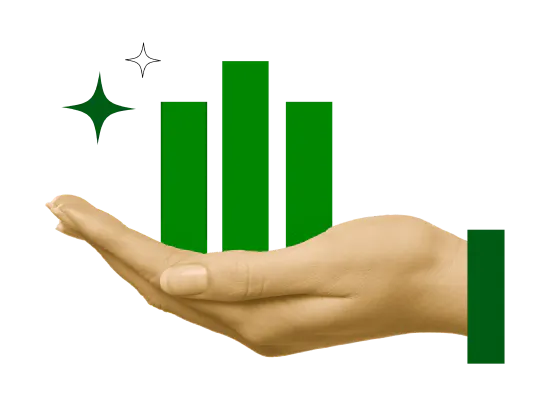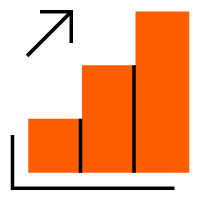Average overall debt
This report provides a picture of average American debt through 90.8 million Credit Karma members with a combined overall debt of more than $8.8 trillion. Overall debt is defined as any type of debt noted on a Credit Karma member’s credit report. This includes credit card, mortgage, student loan, medical loan, auto lease and auto loan debt.
Average total debt slightly up year over year in the fourth quarter of 2024; growth in average debt — except student loan debt — slowed across generations and credit bands
Between October and December 2024, average total overall debt among Credit Karma members was $55,879, a 4.92% year-over-year increase from $53,260 from October to December 2023. Despite this increase, year-over-year growth in average debt was lower across all but one category when compared to YoY growth in the fourth quarter of 2023. In the student loan category, however, average debt increased YoY by 3.14%, compared to a 4.07% YoY drop in October to December 2023.
Among the generations Generation Z experienced the highest YoY growth in average debt across all categories except auto loans in the fourth quarter of 2024. Most notably, the generation saw an 11.82% YoY increase in average overall debt and 10.28% YoY increase in average credit card debt. Still, Gen Z experienced less growth in YoY debt than in the fourth quarter of 2023. For example, Gen Z had a 22.73% YoY jump in average card debt in October to December 2023 — more than 12 percentage points higher than in Q4 2024.
Members in the super prime score band saw the highest YoY increases in average debt across categories except overall debt. This segment had the most YoY growth (10.08%) in average credit card debt. Similar to the generations, though, members in all score bands experienced slower YoY average debt growth across categories in the fourth quarter of 2024 compared to 2023. Notable exceptions were the YoY growth in card debt among members with super prime credit (up 10.08% YoY in Q4 2024 compared to 1.46% in Q4 2023), as well as YoY jumps in average student loan debt growth for all members with student loan debt.
Average inquiries down YoY; average open collections up for members in lower score bands
Year-over-year average debt growth may have slowed because members might be exercising more caution when it comes to taking on more debt. Average inquiries per member were down nearly 9% YoY across generations and score bands, indicating that members applied for fewer credit cards and loans.
This hesitance may be due to increased financial hardship, particularly among members with lower credit scores. Average open collection accounts per member with a collection account(s) on their credit report remained relatively flat YoY, though members in the subprime and near prime score bands experienced more significant jumps (2.7 to 2.9 and 2 to 2.2, respectively).
Average debt among Credit Karma members broken out by generation
| Generation | Average total debt Oct.-Dec. 2023 | Average total debt Oct.-Dec. 2024 | Percent change in debt |
|---|---|---|---|
| Generation Z | $19,441 | $21,739 | 11.82% |
| Millennial | $55,124 | $59,910 | 8.68% |
| Generation X | $65,364 | $68,280 | 4.46% |
| Baby boomers | $54,485 | $55,469 | 1.81% |
| Silent | $42,448 | $43,176 | 1.72% |
For the second year in a row, Gen Z saw the highest year-over-year growth in total average debt, while Generation X continues to hold the highest average amount of debt.
Average debt among Credit Karma members by credit score band
| Credit score band | Average total debt Oct.-Dec. 2023 | Average total debt Oct.-Dec. 2024 | Percent change in debt |
|---|---|---|---|
| Subprime (300–600) | $34,102 | $36,898 | 8.20% |
| Near prime (601–660) | $44,205 | $45,034 | 1.88% |
| Prime (661–780) | $59,565 | $61,835 | 3.81% |
| Super prime (781–850) | $74,843 | $78,402 | 4.76% |
As scores increased, so too did average overall debt. This may be because people with higher credit scores have greater access to credit on better terms. But while members in the subprime score band had the least debt, their average total debt increased the most year over year for the second year in a row. It’s worth noting, however, that the rate of growth slowed considerably in Q4 2024 compared to Q4 2023 (8.2%) versus Q4 2023 compared to Q4 2022 (22.46%).
Average credit card debt
In the fourth quarter of 2024, approximately 85.7 million Credit Karma members with at least one credit card held a total of approximately $536.9 billion in credit card debt.
Similar to last year, members saw the most average debt growth in the credit card category, though growth slowed in 2024. In the fourth quarter of 2023, average credit card debt was up 12.66% YoY. In contrast, the average card balance among members during the period of October to December 2024 was $7,798 — a 7% YoY increase in average credit card debt. The average next payment was $209.
Average credit card debt among Credit Karma members by generation
| Generation | Average credit card debt Oct.-Dec. 2023 | Average credit card debt Oct.-Dec. 2024 | Percent change in credit card debt |
|---|---|---|---|
| Generation Z | $3,414 | $3,764 | 10.28% |
| Millennial | $7,031 | $7,692 | 9.40% |
| Generation X | $9,434 | $10,221 | 8.34% |
| Baby boomers | $7,889 | $8,328 | 5.56% |
| Silent | $5,581 | $5,710 | 2.31% |
Gen X continued to have the most credit card debt in the fourth quarter of 2024, but Gen Z again saw the highest YoY increase in average credit card debt (10.28%), followed by Millennials (9.40%).
Average credit card debt among Credit Karma members by credit score band
| Credit score band | Average credit card debt Oct.-Dec. 2023 | Average credit card debt Oct.-Dec. 2024 | Percent change in credit card debt |
|---|---|---|---|
| Subprime (300–600) | $7,279 | $7,760 | 6.61% |
| Near prime (601–660) | $10,699 | $11,389 | 6.45% |
| Prime (661–780) | $7,440 | $8,137 | 9.37% |
| Super prime (781–850) | $3,394 | $3,736 | 10.08% |
Whereas average card debt grew the most (28.06%) among members with subprime credit in the fourth quarter of 2023 compared to the fourth quarter of 2022, members in the higher credit score bands had the most growth YoY in Q4 2024. Near prime members continued to have the highest average card balances.
Average auto loan debt
In the fourth quarter of 2024, approximately 63.7 million Credit Karma members with at least one auto loan open held more than $962 billion in loan debt.
The average next payment was $656.The average auto loan balance among members continued to remain nearly flat at $25,391 — only a 0.33% YoY increase from $25,307 in October through December 2023.
Average auto loan debt among Credit Karma members by generation
| Generation | Average auto loan debt Oct.-Dec. 2023 | Average auto loan debt Oct.-Dec. 2024 | Percent change in auto loan debt |
|---|---|---|---|
| Generation Z | $21,160 | $21,323 | 0.77% |
| Millennial | $25,295 | $25,521 | 0.89% |
| Generation X | $28,202 | $28,276 | 0.26% |
| Baby boomers | $23,400 | $23,566 | 0.71% |
| Silent | $19,059 | $19,204 | 0.76% |
Average auto loan debt among Credit Karma members by credit score band
| Credit score band | Average auto loan debt Oct.-Dec. 2023 | Average auto loan debt Oct.-Dec. 2024 | Percent change in auto loan debt |
|---|---|---|---|
| Subprime (300–600) | $23,766 | $23,994 | 0.96% |
| Near prime (601–660) | $26,090 | $25,843 | -0.95% |
| Prime (661–780) | $26,576 | $26,783 | 0.78% |
| Super prime (781–850) | $23,337 | $23,604 | 0.97% |
Average mortgage debt
In October through December 2024, approximately 33.7 million Credit Karma members with at least one mortgage held a total of more than $6.5 trillion in mortgage debt. The average mortgage balance among members was nearly flat year over year at $262,997, a 3.79% increase from $253,386 in October to December 2023. The average next payment was $2,061.
Average mortgage debt among Credit Karma members by generation
| Generation | Average mortgage debt Oct.-Dec. 2023 | Average mortgage debt Oct.-Dec. 2024 | Percent change in mortgage debt |
|---|---|---|---|
| Generation Z | $223,366 | $239,242 | 7.11% |
| Millennial | $285,217 | $298,617 | 4.70% |
| Generation X | $254,379 | $260,485 | 2.40% |
| Baby boomers | $195,982 | $198,425 | 1.25% |
| Silent | $170,545 | $173,700 | 1.85% |
Similar to last year, Millennials and Generation Z saw the biggest YoY increases in average mortgage debt, though growth slowed, from 9.08% in the fourth quarter of 2023 to 4.70% for Millennials and from 14.05% to 7.11% for Generation Z.
Average mortgage debt among Credit Karma members by credit score band
| Credit score band | Average mortgage debt Oct.-Dec. 2023 | Average mortgage debt Oct.-Dec. 2024 | Percent change in mortgage debt |
|---|---|---|---|
| Subprime (300–600) | $216,570 | $224,720 | 3.76% |
| Near prime (601–660) | $235,452 | $240,212 | 2.02% |
| Prime (661–780) | $266,945 | $278,461 | 4.31% |
| Super prime (781–850) | $258,318 | $269,536 | 4.34% |
Average mortgage debt increased the most year over year among members in the higher credit score bands. This is a shift from the fourth quarter of 2023, when average mortgage debt grew the most among those in the lower score bands.
Average student loan debt
The student loan category was the only category with a higher year-over-year increase in average debt in Q4 2024 than in Q4 2023. In the fourth quarter of 2024, approximately 31.2 million Credit Karma members with at least one student loan open held a total of $747.5 billion across 81.8 million student loans.
The average next payment was $118.The average student loan balance among members in the fourth quarter of 2024 was $31,667 — up 3.14% compared to the fourth quarter of 2023, when student loan debt was down 4.07% YoY.
Average student loan debt among Credit Karma members by generation
| Generation | Average student loan debt Oct.-Dec. 2023 | Average student loan debt Oct.-Dec. 2024 | Percent change in student loan debt |
|---|---|---|---|
| Generation Z | $16,182 | $17,740 | 7.96% |
| Millennial | $29,955 | $31,575 | 5.41% |
| Generation X | $41,659 | $43,451 | 4.30% |
| Baby boomers | $44,186 | $45,980 | 4.06% |
| Silent | $36,647 | $37,685 | 2.83% |
Year-over-year growth in average student loan picked up in the fourth quarter of 2024 versus the same period in 2023, especially among the younger generations. Average student loan debt among Generation Z increased by 7.96% compared to a 4.70% year-over-year increase in the fourth quarter of 2023. Millennials, who saw a year-over-year decrease in average student loan debt in October to December 2023, experienced a 5.41% increase in 2024.
In fact, all generations except the Silent Generation saw a higher year-over-year increase in average student loan debt in October to December 2024 versus the same period in 2023.
Average student loan debt among Credit Karma members by credit score band
| Credit score band | Average student loan debt Oct.-Dec. 2023 | Average student loan debt Oct.-Dec. 2024 | Percent change in student loan debt |
|---|---|---|---|
| Subprime (300–600) | $28,302 | $29,616 | 4.64% |
| Near prime (601–660) | $29,512 | $30,063 | 1.87% |
| Prime (661–780) | $32,562 | $33,377 | 2.50% |
| Super prime (781–850) | $33,932 | $35,640 | 5.03% |
Average credit scores
The average VantageScore 3.0 credit score for Credit Karma members with debt was 676 in the fourth quarter of 2024, but the median was a little higher at 681. Both fall in the prime range. These scores are slightly up from that of members with debt in October to December 2023 — the average credit score then was 671, and the median was 679.
Average VantageScore 3.0 score among Credit Karma members with debt by generation
| Generation | Average VantageScore 3.0 Oct.-Dec. 2024 |
|---|---|
| Generation Z | 659 |
| Millennial | 669 |
| Generation X | 673 |
| Baby boomers | 715 |
| Silent | 737 |
Accounts in collections
For this report, accounts in collections are any credit card, mortgage, student loan, medical loan, auto lease or auto loan accounts that have been sent to collections agencies, according to their credit reports. Creditors may have different standards for when they transfer debt to collections, but the typical cutoff is 120 to 150 days past due. For this report, we’re able to determine if an account is in collections but not how many days past due it is.
Among Credit Karma members with accounts in collections, the average number of open accounts in October to December 2024 was 2.4 — relatively flat from 2.3 in the fourth quarter of 2023. Only members in the highest score band saw a year-over-year decrease (10%) in average open collection accounts. Members in the subprime and near prime score bands experienced the highest YoY increases.
Keep in mind that this measure only looks at members who have accounts in collections, not the Credit Karma member population as a whole. That means that it only captures people who are already potentially struggling with their finances.
Average number of accounts in collections among Credit Karma members by generation
| Generation | Average number of accounts in collections for Credit Karma members Oct.-Dec. 2023 | Average number of accounts in collections for Credit Karma members Oct.-Dec. 2024 | Percent change in average open collection account |
|---|---|---|---|
| Generation Z | 1.9 | 1.9 | 0% |
| Millennial | 2.3 | 2.4 | 4.35% |
| Generation X | 2.5 | 2.6 | 4% |
| Baby boomers | 2.2 | 2.3 | 4.55% |
| Silent | 1.9 | 1.9 | 0% |
Average number of accounts in collections by VantageScore 3.0 credit score band
| Credit score band | Average number of accounts in collections for Credit Karma members Oct.-Dec. 2023 | Average number of accounts in collections for Credit Karma members Oct.-Dec. 2024 | Percent change in average open collection account |
|---|---|---|---|
| Subprime (300–600) | 2.7 | 2.9 | 7.41% |
| Near prime (601–660) | 2.0 | 2.2 | 10% |
| Prime (661–780) | 1.3 | 1.3 | 0% |
| Super prime (781–850) | 1.0 | 0.9 | -10% |
Average credit inquiries
For this report, credit inquiries are applications for new credit, such as credit cards or loans. During October to December 2024, Credit Karma members averaged 3.1 credit inquiries, a slight YoY drop from 3.4.
The average number of inquiries dropped across all score bands and generations year over year for the second year in a row, revealing that members, particularly those in the lower score bands, continue to apply for fewer credit and loan products.
Average number of credit inquiries by Credit Karma members by VantageScore 3.0 credit score band
| Credit score band | Average number of inquiries for Credit Karma members Oct.-Dec. 2023 | Average number of inquiries for Credit Karma members Oct.-Dec. 2024 | Percent change in inquiries |
|---|---|---|---|
| Subprime (300–600) | 5.3 | 4.8 | -9.43% |
| Near prime (601–660) | 4.1 | 3.8 | -7.32% |
| Prime (661–780) | 3 | 2.8 | -6.67% |
| Super prime (781–850) | 2 | 1.9 | -5% |
Average number of credit inquiries by Credit Karma members by generation
| Generation | Average number of inquiries for Credit Karma members Oct.-Dec. 2023 | Average number of inquiries for Credit Karma members Oct.-Dec. 2024 | Percent change in inquiries |
|---|---|---|---|
| Generation Z | 3.1 | 2.9 | -6.45% |
| Millennial | 3.5 | 3.2 | -8.57% |
| Generation X | 3.9 | 3.5 | -10.26% |
| Baby boomers | 3.6 | 3.3 | -8.33% |
| Silent | 3.1 | 2.8 | -9.68% |
Methodology
This report drew on insights from the aggregated reports of roughly 90.8 million Credit Karma users. All aggregate data analyzed was pulled on January 6, 2025, and came from members’ TransUnion credit reports. Averages were based on information from the previous 90 days.








